
Find Help
More Items From Ergsy search
-

Are measles outbreaks common in the UK?
Relevance: 100%
-

Why are measles outbreaks still occurring?
Relevance: 92%
-

How does the UK monitor measles outbreaks?
Relevance: 92%
-
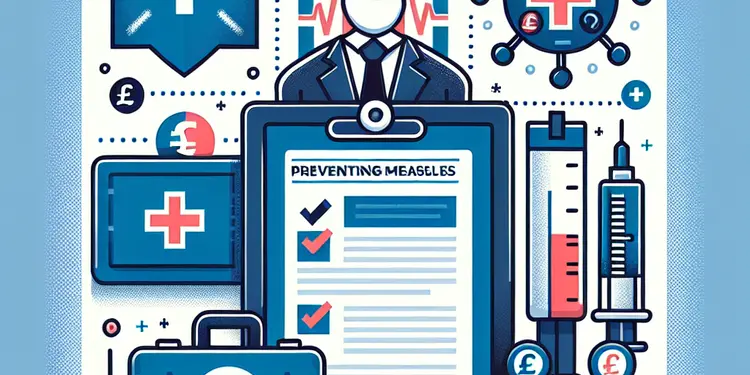
How can measles outbreaks be prevented?
Relevance: 91%
-
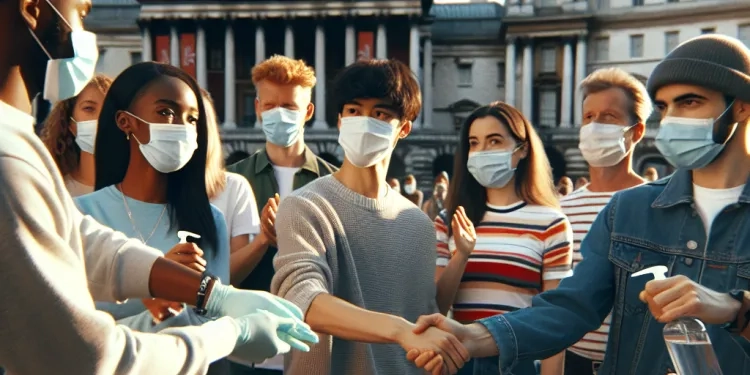
What should you do during a measles outbreak?
Relevance: 87%
-
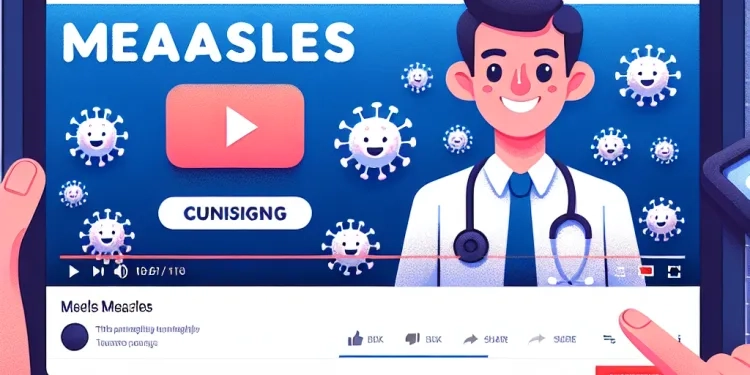
Measles
Relevance: 72%
-

Are measles cases rising in the UK?
Relevance: 69%
-

How contagious is measles?
Relevance: 68%
-

Is there a treatment for measles?
Relevance: 67%
-

Are measles cases currently rising in the UK?
Relevance: 67%
-
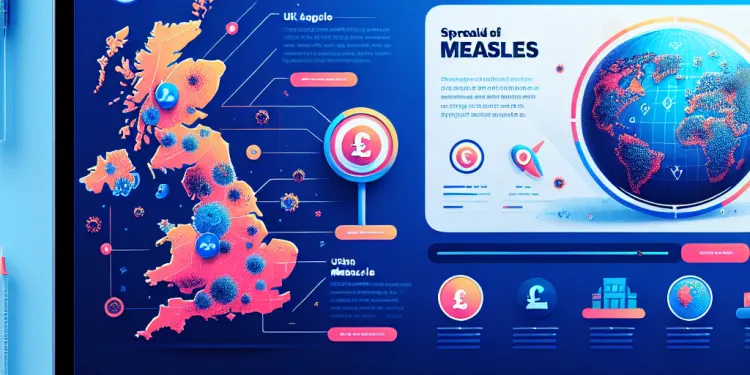
Are measles more common outside of the UK?
Relevance: 66%
-

Why is measles less common in the UK?
Relevance: 66%
-
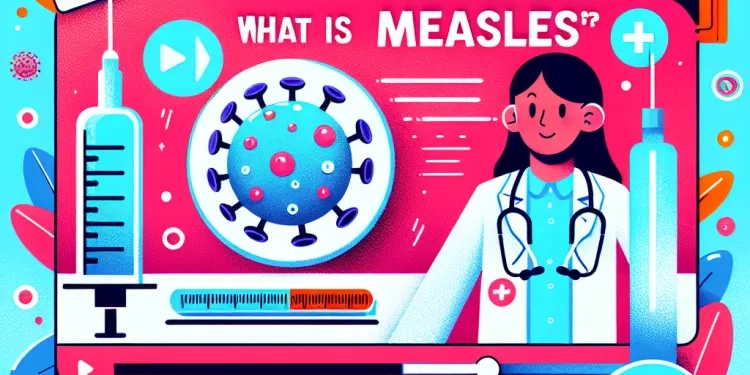
What is measles?
Relevance: 66%
-

What is causing the rise in measles cases in the UK?
Relevance: 65%
-

How is measles spread?
Relevance: 65%
-
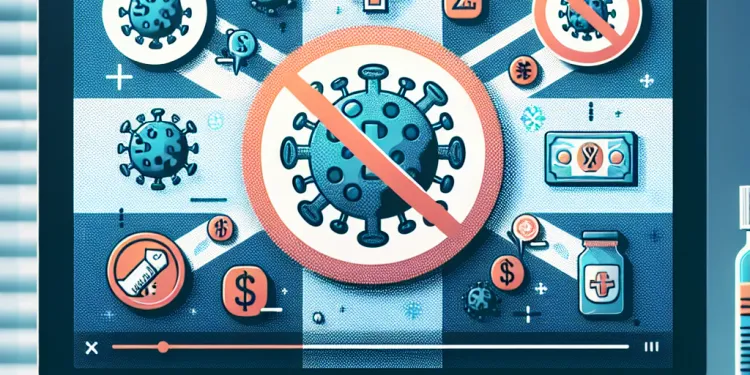
How can measles be prevented?
Relevance: 65%
-

Is there a treatment for measles?
Relevance: 64%
-

Which countries have higher rates of measles?
Relevance: 63%
-

How is measles transmitted?
Relevance: 63%
-

How is measles transmitted?
Relevance: 63%
-

Are adults in the UK at risk from measles?
Relevance: 63%
-

Can measles be serious?
Relevance: 62%
-
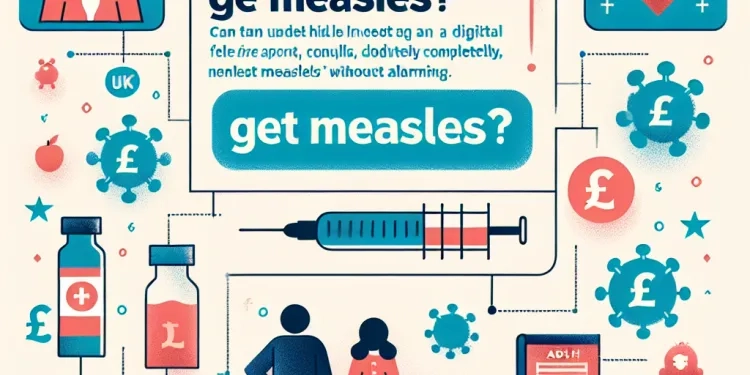
Can adults get measles?
Relevance: 62%
-

Is it necessary to get a measles vaccine before travelling?
Relevance: 61%
-

How does vaccination affect measles rates?
Relevance: 60%
-

Is there a risk of global spread if measles cases rise in the UK?
Relevance: 60%
-

What are the symptoms of measles?
Relevance: 60%
-

What is herd immunity and how does it relate to measles?
Relevance: 59%
-
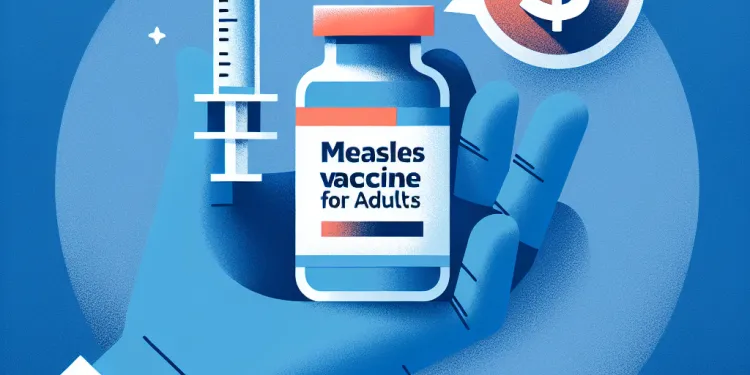
Can the measles vaccine be given to adults?
Relevance: 58%
-

What is the current measles vaccination coverage in the UK?
Relevance: 58%
-

What are the symptoms of measles?
Relevance: 58%
-

Who is most at risk from measles?
Relevance: 56%
-
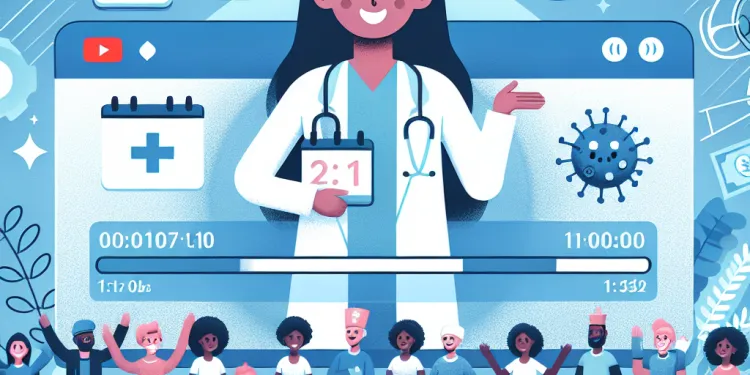
How long is a person with measles contagious?
Relevance: 55%
-

What should I do if I suspect I have measles?
Relevance: 54%
-
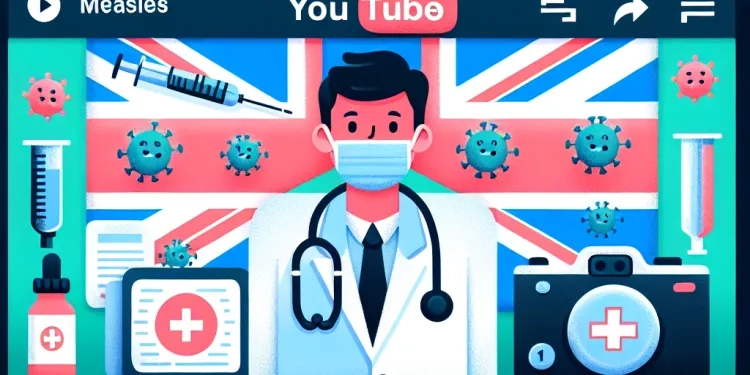
Can you get measles more than once?
Relevance: 54%
-

Can measles cause complications?
Relevance: 54%
-

Can measles be treated?
Relevance: 53%
-

What are the symptoms of measles?
Relevance: 53%
-

Is Rubella the same as measles?
Relevance: 53%
-

What complications can arise from measles?
Relevance: 53%
Are Measles Outbreaks Common in the UK?
Current Status of Measles in the UK
Measles outbreaks in the United Kingdom are not as common as they once were, thanks to widespread vaccination programs. However, intermittent outbreaks still occur, primarily due to gaps in vaccine coverage in certain communities. Nationwide efforts led by the National Health Service (NHS) have significantly reduced the incidence of measles by ensuring that most young children receive the MMR (measles, mumps, and rubella) vaccine.
The Role of Vaccination
Vaccination plays a crucial role in controlling measles outbreaks. The World Health Organization recommends a 95% vaccination rate to achieve herd immunity, effectively preventing the spread of the virus. While the UK has made significant progress in reaching this target, there are pockets of under-vaccination that pose a challenge. Delays in vaccination or misinformation about vaccine safety can lead to temporary drops in vaccination coverage, increasing the risk of outbreaks.
Factors Contributing to Outbreaks
Several factors contribute to measles outbreaks in the UK. International travel can introduce the virus, as measles is still prevalent in parts of the world where vaccination coverage is lower. Additionally, communities with lower vaccination rates, either due to accessibility issues or vaccine hesitancy, can become hotspots for the disease. Public health campaigns continue to address these challenges by promoting the benefits of the MMR vaccine and making it accessible to all.
Steps to Prevent Future Outbreaks
To prevent future measles outbreaks, public health authorities encourage regular vaccination updates and monitor vaccine coverage across regions. Efforts to educate the public about vaccine safety and the importance of timely immunization are crucial. The NHS works with schools and healthcare providers to ensure easy access to vaccinations and timely reminders for parents. By maintaining high vaccination rates and swiftly responding to any outbreaks, the UK can continue to protect its population from measles.
Are Measles Outbreaks Common in the UK?
Current Status of Measles in the UK
In the UK, measles outbreaks are less common now because most kids get vaccinated. Vaccines really help! But, sometimes, there are still outbreaks. This happens in places where not enough people get vaccinated. The NHS (National Health Service) works hard to make sure kids get the MMR vaccine. This vaccine protects against measles, mumps, and rubella.
The Role of Vaccination
Vaccines are very important to stop measles. The World Health Organization says we need 95 out of 100 people to get vaccinated. This helps stop the measles virus from spreading. The UK is doing well, but some places still need more people to get vaccinated. Sometimes, people do not get vaccinated because they hear wrong information or have to wait too long. This can make outbreaks happen.
Factors Contributing to Outbreaks
There are reasons why measles can spread. People traveling from other countries can bring the virus if those places do not have many vaccines. Some communities do not have enough people vaccinated. This can be because vaccines are hard to get or people are worried about them. Public health campaigns help by telling people how good the MMR vaccine is and making sure everyone can get it easily.
Steps to Prevent Future Outbreaks
To stop measles in the future, people need to keep getting their vaccines on time. Public health workers teach people about how safe vaccines are and why they are important. The NHS works with schools and doctors to make it easy for parents to get their kids vaccinated. By keeping vaccination rates high and acting fast when there is an outbreak, the UK can keep everyone safe from measles.
Frequently Asked Questions
Are measles outbreaks common in the UK?
Measles outbreaks are not very common in the UK due to widespread vaccination, but cases do occur occasionally.
How is measles transmitted?
Measles is highly contagious and spreads through droplets from the nose, mouth, or throat of infected individuals.
What are the symptoms of measles?
Symptoms include high fever, cough, runny nose, red eyes, and a characteristic red rash that usually begins on the face and spreads.
Who is at risk for measles?
Unvaccinated individuals, including infants too young to be vaccinated, and those with compromised immune systems are at higher risk.
How is measles diagnosed?
A doctor can diagnose measles based on symptoms and confirmed with a blood test or throat/nose swab.
What is the treatment for measles?
There's no specific antiviral treatment for measles. Care focuses on relieving symptoms and managing complications.
What is the best way to prevent measles?
Vaccination with the MMR (measles, mumps, rubella) vaccine is the best way to prevent measles.
Is the MMR vaccine safe?
Yes, the MMR vaccine is safe and effective at preventing measles, mumps, and rubella.
Can adults get the measles vaccine?
Adults who have not been vaccinated or are unsure about their immunity can receive the MMR vaccine.
What should I do if I suspect measles?
Contact your GP or NHS 111 for advice. Do not visit your GP surgery or A&E to prevent spreading the virus.
How effective is the MMR vaccine?
The MMR vaccine is about 97% effective at preventing measles after two doses.
Are there any side effects of the MMR vaccine?
Side effects are usually mild and can include a sore arm, fever, or mild rash.
Why are measles outbreaks still happening?
Outbreaks can still happen in communities with low vaccination rates or due to international travel.
Has there been a recent measles outbreak in the UK?
Outbreaks occur occasionally in the UK, but they are generally contained quickly due to vaccination efforts.
Can measles have complications?
Yes, measles can lead to complications like pneumonia, encephalitis, and in rare cases, death.
Do people in the UK get measles a lot?
Measles is an illness. It can make you feel very sick. Let's find out if many people in the UK get measles!
What is measles? It is a disease that can give you a fever and a rash. It can spread from one person to another.
Do many people get it in the UK? Sometimes, yes. But we can use a vaccine to stop it from spreading too much.
How can you stay safe?
- Get a vaccine. It helps keep you safe from measles.
- Wash your hands. This helps stop germs from spreading.
- If you feel sick, tell a grown-up. They can help you get better.
If you want more help to understand, ask a teacher or a parent. They can read with you and explain things.
There are not many measles outbreaks in the UK because most people get a vaccine. But sometimes, cases still happen.
How do people catch measles?
Measles spreads easily.
You can catch it from tiny drops in the air when someone with measles coughs or sneezes.
It can also spread by touching surfaces where the drops land, then touching your face.
Wash your hands and cover your mouth to help stop it from spreading.
If you need help reading, try asking someone to read it with you.
Using pictures can also help understand how it spreads.
Measles is very easy to catch. It spreads when tiny drops from the nose, mouth, or throat of someone who is sick get into the air.
What are the signs of measles?
Measles is a sickness. Here are some signs to look for:
- A fever. This means feeling very hot.
- A cough. This is when your throat feels scratchy, and you need to cough.
- A runny nose. This is when your nose keeps dripping.
- Red eyes. Your eyes might feel sore or itchy.
- A rash. This is red spots on your skin.
If you think you have measles, tell a grown-up. They can help you see a doctor.
You can use pictures to help understand. Ask someone to read with you if you need help.
Signs you are sick include:
- High temperature (fever)
- Coughing
- Runny or stuffy nose
- Red eyes
- Red spots on your skin that start on the face and spread
You can use a thermometer to check if you have a fever. Resting and drinking water can help you feel better. Tell an adult if you feel sick.
Who can get measles?
People who have not had their vaccines, like babies who are too little to get them, and people with weak immune systems, are more likely to get sick.
How do doctors know if someone has measles?
Doctors can tell if someone has measles. Here is how they do it:
- Look at the rash: Measles has a special rash with red spots.
- Ask about other measles signs: Like a fever, cough, or runny nose.
- Do a blood test: This helps make sure it is measles.
If you think you might have measles, it is important to see a doctor. They can help you get better.
A doctor can tell if you have measles by looking at your symptoms. They might do a blood test or take a sample from your throat or nose to be sure.
How do you get better from measles?
There is no special medicine to make measles go away. It's important to help the person feel better and take care of any problems they might have.
How can you stop measles?
Getting the MMR shot is the best way to stop you from getting measles. MMR stands for measles, mumps, and rubella. It keeps you safe from these illnesses.
Is the MMR vaccine safe?
The MMR vaccine is very safe. It helps protect you from three diseases: measles, mumps, and rubella. These diseases can make you very sick.
Doctors and scientists check vaccines to make sure they are safe. Most people have no or only mild side effects after the vaccine, like a sore arm or feeling tired.
If you are worried, talk to a doctor or nurse. They can explain more about the vaccine. You can also ask friends or family for help.
You can use simple tools like a reading ruler or an audio book to help understand better.
Yes, the MMR shot is safe. It stops you from getting sick with measles, mumps, and rubella.
Can grown-ups get the measles shot?
Yes, grown-ups can get the measles shot. This shot helps stop them from getting sick. If you have not had the shot before, talk to your doctor. They can give you the shot.
Here are some tips to help understand:
- Ask someone you trust to read with you.
- Use a pointer or finger to follow each word.
- Take your time and read slowly.
Grown-ups who have not had their vaccine shots or do not know if they are safe can get the MMR vaccine.
What should I do if I think someone has measles?
If you think someone has measles, here are the steps to take: 1. **Talk to a Doctor:** Call or visit a doctor right away. 2. **Stay Away from Others:** Keep away from other people to stop the measles from spreading. 3. **Watch for Symptoms:** Look out for signs like fever, rash, cough, and runny nose. 4. **Use Technology:** Use apps or websites to help you understand symptoms. Remember, you should always ask for help if you need it.Call your doctor or NHS 111 for help. Do not go to the doctor’s office or the hospital. This helps stop the virus from spreading.
How well does the MMR vaccine work?
The MMR vaccine works really well. It can stop measles in 97 out of 100 people after they get two shots.
Does the MMR vaccine have side effects?
The MMR vaccine is a shot. It helps keep you safe from three diseases: measles, mumps, and rubella.
Most people do not have problems after the shot. But some people might feel:
- A sore arm where the shot was given
- A slight fever
- A mild rash
These are usually mild and go away in a few days.
If you feel worried, you can talk to a doctor or nurse. They can help you.
You can also use helpful ways to stay calm, like:
- Taking deep breaths
- Listening to music you like
- Bringing a favorite toy or book to your appointment
When you get a shot, you might feel a little sore in your arm. You could also get a fever or a small rash. These things are normal and usually not too bad.
Why do people still get sick with measles?
Sometimes, many people can get sick in places where not many people have had their shots, or if people bring sickness from other countries when they travel.
Is there a new measles outbreak in the UK?
Let's find out if there are new cases of measles in the UK. Measles is a sickness that can make you feel very unwell. To get updates, you can:
- Look at news websites.
- Ask a doctor or nurse.
- Listen to the radio or watch TV news.
If you are worried about measles, you can talk to someone you trust or ask a doctor for more help.
Sometimes, diseases spread in the UK. But, they usually stop quickly because people get vaccinated.
Can measles cause problems?
Yes, measles can cause other health problems. Most people get better, but some may have:
- Ear infections
- Lung infections (like pneumonia)
- Swelling in the brain (this is rare)
If you or someone you know has measles, it helps to:
- See a doctor
- Rest a lot
- Drink lots of water
Ask a grown-up or use pictures and videos to learn more about measles.
Yes, measles can cause problems like bad lung infections, brain swelling, and sometimes, it can be very dangerous and cause death.
Tools like pictures can help explain these ideas.
Useful Links
This website offers general information and is not a substitute for professional advice.
Always seek guidance from qualified professionals.
If you have any medical concerns or need urgent help, contact a healthcare professional or emergency services immediately.
Some of this content was generated with AI assistance. We’ve done our best to keep it accurate, helpful, and human-friendly.
- Ergsy carfully checks the information in the videos we provide here.
- Videos shown by Youtube after a video has completed, have NOT been reviewed by ERGSY.
- To view, click the arrow in centre of video.
- Most of the videos you find here will have subtitles and/or closed captions available.
- You may need to turn these on, and choose your preferred language.
- Go to the video you'd like to watch.
- If closed captions (CC) are available, settings will be visible on the bottom right of the video player.
- To turn on Captions, click settings .
- To turn off Captions, click settings again.
More Items From Ergsy search
-

Are measles outbreaks common in the UK?
Relevance: 100%
-

Why are measles outbreaks still occurring?
Relevance: 92%
-

How does the UK monitor measles outbreaks?
Relevance: 92%
-

How can measles outbreaks be prevented?
Relevance: 91%
-

What should you do during a measles outbreak?
Relevance: 87%
-

Measles
Relevance: 72%
-

Are measles cases rising in the UK?
Relevance: 69%
-

How contagious is measles?
Relevance: 68%
-

Is there a treatment for measles?
Relevance: 67%
-

Are measles cases currently rising in the UK?
Relevance: 67%
-

Are measles more common outside of the UK?
Relevance: 66%
-

Why is measles less common in the UK?
Relevance: 66%
-

What is measles?
Relevance: 66%
-

What is causing the rise in measles cases in the UK?
Relevance: 65%
-

How is measles spread?
Relevance: 65%
-

How can measles be prevented?
Relevance: 65%
-

Is there a treatment for measles?
Relevance: 64%
-

Which countries have higher rates of measles?
Relevance: 63%
-

How is measles transmitted?
Relevance: 63%
-

How is measles transmitted?
Relevance: 63%
-

Are adults in the UK at risk from measles?
Relevance: 63%
-

Can measles be serious?
Relevance: 62%
-

Can adults get measles?
Relevance: 62%
-

Is it necessary to get a measles vaccine before travelling?
Relevance: 61%
-

How does vaccination affect measles rates?
Relevance: 60%
-

Is there a risk of global spread if measles cases rise in the UK?
Relevance: 60%
-

What are the symptoms of measles?
Relevance: 60%
-

What is herd immunity and how does it relate to measles?
Relevance: 59%
-

Can the measles vaccine be given to adults?
Relevance: 58%
-

What is the current measles vaccination coverage in the UK?
Relevance: 58%
-

What are the symptoms of measles?
Relevance: 58%
-

Who is most at risk from measles?
Relevance: 56%
-

How long is a person with measles contagious?
Relevance: 55%
-

What should I do if I suspect I have measles?
Relevance: 54%
-

Can you get measles more than once?
Relevance: 54%
-

Can measles cause complications?
Relevance: 54%
-

Can measles be treated?
Relevance: 53%
-

What are the symptoms of measles?
Relevance: 53%
-

Is Rubella the same as measles?
Relevance: 53%
-

What complications can arise from measles?
Relevance: 53%


